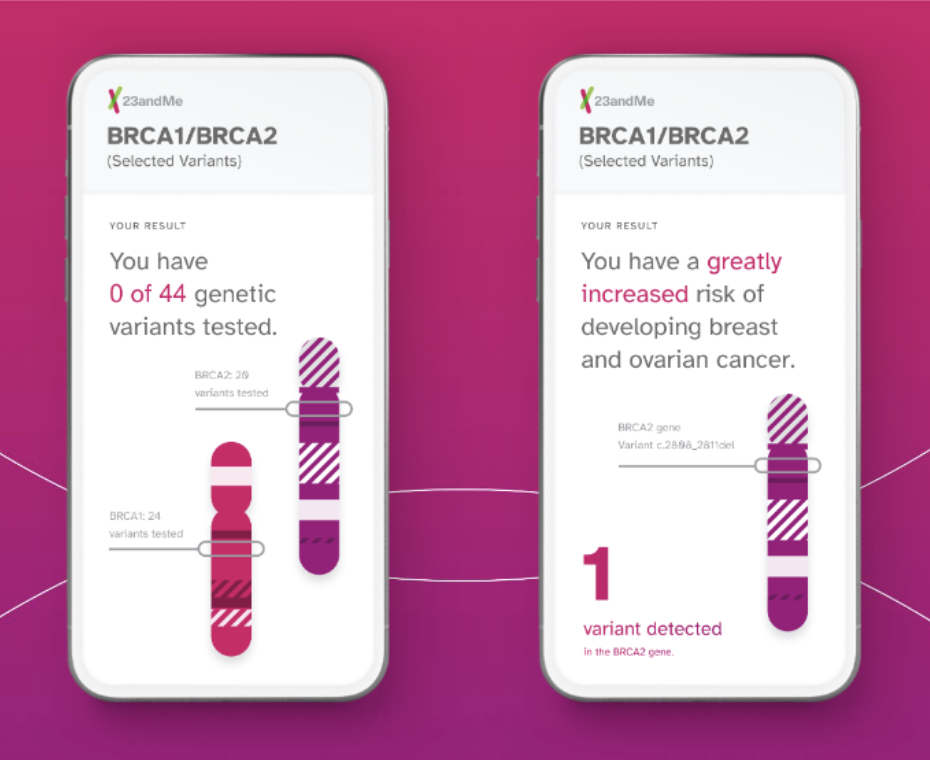Expands Coverage for Underrepresented Populations

As we recognize Breast Cancer Awareness Month, 23andMe is also releasing its expanded BRCA1/BRCA2 (Selected Variants) Genetic Health Risk report,* adding 41 additional variants to the report. Many of these variants are more common in people of African American, Hispanic/Latino, and Asian descent.
All of these variants are associated with a higher likelihood of breast, ovarian, prostate, and pancreatic cancer, no matter your ancestry. This new addition builds upon 23andMe’s original BRCA1/BRCA2 (Selected Variants) Genetic Health Risk report, which in 2018 received the first-ever FDA authorization for a direct-to-consumer genetic health risk test for cancer. The original report provided information on three BRCA1/2 variants, most prevalent in those with Ashkenazi Jewish ancestry.
Addressing Health Disparities in Cancer Risk Detection
Adding additional variants to the BRCA1/BRCA2 (Selected Variants) Genetic Health Risk report will expand the number of people benefitting from the report. Studies have found that more than 80 percent of people with a BRCA1 or BRCA2 risk variant don’t know they have it. Many do not have a family history of cancer that would qualify them for traditional genetic testing through a healthcare professional. Layered onto that are disparities in access to BRCA1/2 genetic testing in some communities in the U.S., including the Black, Hispanic/Latino, and Asian communities. Black Americans also experience dramatic disparities in breast cancer outcomes, according to published research by the American Cancer Society.
“While the incidence of breast cancer is higher in white women, Black women are more likely to die of breast cancer,” said Vina Morris, a two-time breast cancer survivor and founder of the breast cancer awareness organization AfroPink. “This startling health disparity may be explained through lack of access to quality healthcare and delayed screening, which prevents earlier detection and more promising treatment options.”
AfroPink is a non-profit breast cancer awareness organization that focuses on dispelling myths about the disease within the Afro-American community. The group also provides resources and encourages prevention.
More Coverage Helping More People
Vina attended a recent Breast Cancer Awareness Month event in New York City. She was there with 23andMe’s Vice President of Genomic Health, Noura Abul-Husn, MD, PhD. Noura highlighted the expanded coverage of 23andMe’s BRCA1/BRCA2 (Selected Variants) Genetic Health Risk report. Noura noted that more than 20,000 23andMe customers — including both female and male customers — have one of the risk variants included in the updated report.
The 44 genetic variants included in the report account for about 30-to-40 percent of cancer-related BRCA variants among people of African American, non-Ashkenazi European, and Hispanic/Latino descent. The added variants also include several in people of East Asian and South Asian descent. Thousands of variants within the BRCA1 and BRCA2 genes confer an increased risk for cancer. While this report includes some more common variants, it does not include all BRCA risk variants. Knowing one has a variant offers customers a chance to discuss options with their healthcare provider. This might involve getting confirmatory genetic testing or taking preventive action. They may also include enhanced surveillance of prophylactic surgery or medication.
Availability
The expanded report is available to existing 23andMe Health + Ancestry Service customers who were genotyped on 23andMe’s latest genotyping chip, V5. As with select other Genetic Health Risk reports*, customers must specifically opt-in if they want to view the the report. The report also includes an education module. This ensures customers are thoroughly informed on what they can learn, the report’s limitations, and how to use the results.
The 23andMe BRCA1/BRCA2 (Selected Variants) Genetic Health Risk report utilizes the same informational concepts previously demonstrated in studies submitted to the FDA for its Genetic Health Risk reports. Those were shown to have 90 percent or greater overall user comprehension in a demographically diverse population study.
23andMe also carried out robust analytical validation studies to meet FDA requirements. This allowed 23andMe to add variants to the BRCA1/BRCA2 (Selected Variants) Genetic Health Risk report. Each variant tested demonstrated >99 percent concordance with Sanger sequencing. 23andMe also showed >99 percent reproducibility when tested under different laboratory conditions.
Find Out More
23andMe Health + Ancestry customers on the lastest chip who want to see their BRCA1/BRCA2 (Selected Variants) Genetic Health Risk report can go here.
Not yet a customer? Find out more about 23andMe’s Health + Ancestry Service and all the other services offered to customers here.
Disclaimer
**The 23andMe PGS test includes health predisposition and carrier status reports. Health predisposition reports include both reports that meet FDA requirements for genetic health risks and reports which are based on 23andMe research and have not been reviewed by the FDA. The test uses qualitative genotyping to detect select clinically relevant variants in the genomic DNA of adults from saliva for the purpose of reporting and interpreting genetic health risks and reporting carrier status. It is not intended to diagnose any disease. Your ethnicity may affect the relevance of each report and how your genetic health risk results are interpreted. Each genetic health risk report describes if a person has variants associated with a higher risk of developing a disease, but does not describe a person’s overall risk of developing the disease. The test is not intended to tell you anything about your current state of health, or to be used to make medical decisions, including whether or not you should take a medication, how much of a medication you should take, or determine any treatment.
Warnings & Limitations:
The 23andMe PGS Genetic Health Risk Report for BRCA1/BRCA2 (Selected Variants) is indicated for reporting of 44 variants in the BRCA1 and BRCA2 genes. The report describes if a person’s genetic result is associated with an increased risk of developing breast cancer and ovarian cancer. These variants also may be associated with an increased risk for prostate cancer, pancreatic cancer, and potentially other cancers. The variants included in this report do not represent the majority of the BRCA1/BRCA2 variants in people of most ethnicities. This report does not include variants in other genes linked to hereditary cancers. In addition, the absence of variants included in this report does not rule out the presence of other genetic variants that may impact cancer risk. This report is for over-the-counter use by adults over the age of 18. It provides genetic information to inform discussions with a healthcare professional. The PGS test is not a substitute for visits to a healthcare professional for recommended screenings or appropriate follow-up. Results should be confirmed by an independent genetic test prescribed by your own healthcare provider before taking any medical action. For important information and limitations regarding each genetic health risk report, visit 23andme.com/test-info.




